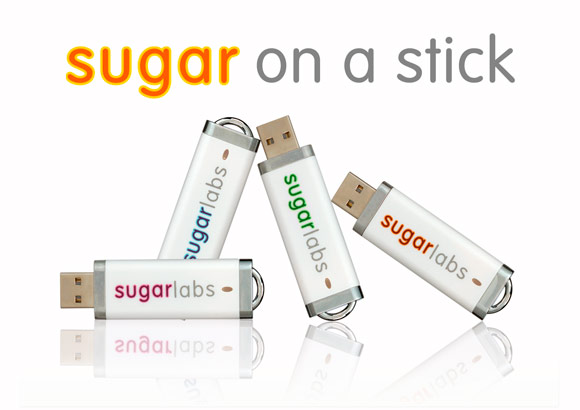Sugar Labs Debuts More Reliable Mirabelle Educational OS
A lot of work is being done to bring more software and hardware to
students across the world who couldn't normally afford to own a PC or
interact with an operating system in one way or another. OLPC's XO
laptop has certainly found its way into a great many classrooms around
the globe, but they can't do it alone. Sugar Labs is another company
aimed at providing educational software to developing nations. The
company has been rather quiet of late, but they're shaking things up
somewhat with a new version of Sugar On A Stick.
It's a unique name for a unique software set, with Mirabelle being the code-name for the third version of it. It's described as a "collaborative learning environment that can be loaded onto any ordinary USB thumbdrive and used with a PC, netbook or Mac without touching the hard disk," making it super light and easy to install in a variety of machines. It'll run natively on major GNU/Linux distributions and can also run in virtualization under Microsoft Windows and Apple OS X, so even older/mixed platform environments can usually handle it.

The company claims that v3 adds improved stability and simplified customization to curious teachers interested in testing Sugar on new netbooks or PCs already in the classroom. In other news, Sugar Labs is also aking available a Sugar Creation Kit, a downloadable DVD which includes Mirabelle, documentation, and a library of Sugar Activities, fun and engaging programs for children taken from the Sugar Activity Library. No, this stuff won't replace MeeGo, Windows, Ubuntu or any of those other major operating systems, but it just might change the world of a child who doesn't have access to any of those. And that's a nice thought, isn't it?
It's a unique name for a unique software set, with Mirabelle being the code-name for the third version of it. It's described as a "collaborative learning environment that can be loaded onto any ordinary USB thumbdrive and used with a PC, netbook or Mac without touching the hard disk," making it super light and easy to install in a variety of machines. It'll run natively on major GNU/Linux distributions and can also run in virtualization under Microsoft Windows and Apple OS X, so even older/mixed platform environments can usually handle it.

The company claims that v3 adds improved stability and simplified customization to curious teachers interested in testing Sugar on new netbooks or PCs already in the classroom. In other news, Sugar Labs is also aking available a Sugar Creation Kit, a downloadable DVD which includes Mirabelle, documentation, and a library of Sugar Activities, fun and engaging programs for children taken from the Sugar Activity Library. No, this stuff won't replace MeeGo, Windows, Ubuntu or any of those other major operating systems, but it just might change the world of a child who doesn't have access to any of those. And that's a nice thought, isn't it?
Sugar Labs Announces New Version of Sugar on a Stick, Educational Software for Children
BERLIN, June 10, 2010 — LinuxTag — Sugar Labs(R), nonprofit provider of the Sugar Learning Platform to over one and a half million children worldwide, has released Mirabelle, the third version of Sugar on a Stick, a collaborative learning environment that can be loaded onto any ordinary USB thumbdrive and used with a PC, netbook or Mac without touching the hard disk. It is available free for download at http://wiki.sugarlabs.org/go/Sugar_on_a_Stick. Sugar runs natively on major GNU/Linux distributions and can also run in virtualization under Microsoft Windows and Apple OS X.
One year after the premiere of v1 Strawberry at LinuxTag 2009 and following v2 Blueberry last December, v3 Mirabelle brings improved stability and simplified customization to curious teachers interested in testing Sugar on new netbooks or PCs already in the classroom. We suggest teachers reach out to university-level computer science and education schools to build local support structures, important with an ICT project.
Sebastian Dziallas, Project Lead for Sugar on a Stick and a recent high school graduate based in Germany, said, “Teachers have told us how important reliability is in the classroom while engaging students, so we decided to create a release that has a stable core and can be customized to fit every deployment’s needs. Mirabelle is a solid baseline which teachers can customize with Activities interesting to young learners. Part of our strategy is to achieve sustainable development while inviting new contributors. We achieved this by integrating Sugar on a Stick more closely with Fedora, the underlying GNU/Linux distribution; Mirabelle is now an official Fedora Spin.”
Sugar Labs is also making available a Sugar Creation Kit, a downloadable DVD which includes Mirabelle, documentation, and a library of Sugar Activities, fun and engaging programs for children taken from the Sugar Activity Library (http://activities.sugarlabs.org).
Thomas Gilliard, a Sugar Labs contributor, said, “The Sugar Creation Kit turns any PC into a Sugar on a Stick generating station. Tools and documentation are gathered on one disk; busy teachers don’t have to hunt down anything. This makes it possible to work via ’sneaker net’ and in a classroom behind a firewall.”

